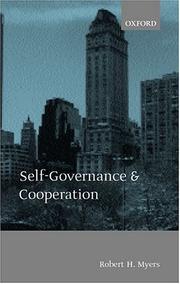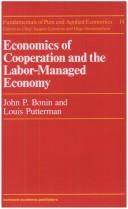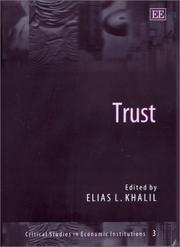| Listing 1 - 10 of 56 | << page >> |
Sort by
|

ISBN: 0198238398 9780198238393 Year: 1999 Publisher: Oxford Oxford university Press
Abstract | Keywords | Export | Availability | Bookmark
 Loading...
Loading...Choose an application
- Reference Manager
- EndNote
- RefWorks (Direct export to RefWorks)
Ethics. --- Cooperation. --- Consequentialism (Ethics) --- Consequentialism (Ethics). --- Cooperation --- Ethics --- Deontology --- Ethics, Primitive --- Ethology --- Moral philosophy --- Morality --- Morals --- Philosophy, Moral --- Science, Moral --- Philosophy --- Values --- Collaborative economy --- Cooperative distribution --- Cooperative movement --- Distribution, Cooperative --- Peer-to-peer economy --- Sharing economy --- Economics --- Profit-sharing --- Utilitarianism
Book
ISBN: 2738108091 9782738108098 Year: 2000 Publisher: Paris Jacob
Abstract | Keywords | Export | Availability | Bookmark
 Loading...
Loading...Choose an application
- Reference Manager
- EndNote
- RefWorks (Direct export to RefWorks)
Que vous soyez pour ou contre, de droite ou de gauche, vous croyez tout savoir sur le libéralisme, "sauvage" pour les uns, "salutaire" pour les autres. Mais pourquoi faut-il supprimer la législation sur la concurrence, instaurer la liberté d’immigration, supprimer le monopole de la Sécurité sociale ou encore recourir aux privatisations pour résoudre les problèmes écologiques ? Pourquoi l’euro n’est-il pas une invention libérale ? Pourquoi la mondialisation est-elle préférable à l’intégration régionale ? Pourquoi la politique de stabilisation est-elle une source d’instabilité économique ? Une réévaluation en profondeur de la pensée libérale ; une contribution iconoclaste aux débats sur les principes et la philosophie qui doivent nous guider. Et si le libéralisme, fort des trois principes que sont la liberté, la propriété, la responsabilité, était le véritable humanisme, la seule vraie utopie réaliste qui autorise la plus belle des espérances pour notre temps : la confiance optimiste dans l’individu ?
Liberalism --- Cooperation. --- Responsibility. --- 329.12 --- Cooperation --- Responsibility --- Accountability --- Moral responsibility --- Obligation --- Ethics --- Supererogation --- Liberal egalitarianism --- Liberty --- Political science --- Social sciences --- Collaborative economy --- Cooperative distribution --- Cooperative movement --- Distribution, Cooperative --- Peer-to-peer economy --- Sharing economy --- Economics --- Profit-sharing --- Liberalism. --- Liberalism - France.
Book
ISBN: 0262016796 0262526662 0262302810 9780262302814 9780262016797 9780262526661 0262300494 Year: 2012 Volume: 2012 Publisher: Cambridge, Mass. : The MIT Press,
Abstract | Keywords | Export | Availability | Bookmark
 Loading...
Loading...Choose an application
- Reference Manager
- EndNote
- RefWorks (Direct export to RefWorks)
Kim Sterelny develops a novel account of the speed and extent of human evolutionary divergence from the great ape stock. The book does not explain human uniqueness by positing a critical adaptive breakthrough (episodic memory; advanced theory of mind; planning and causal reasoning; language). Rather, it identifies a series of positive feedback loops between initially minor advances in social tolerance, ecological flexibility, cooperative foraging, social learning, and links the results of these feedback loops to the archaeological and anthropological record.
Evolutionary psychology. --- Cooperation. --- COGNITIVE SCIENCES/General --- BIOMEDICAL SCIENCES/Evolution --- PHILOSOPHY/General --- Evolutionary psychology --- Cooperation --- Biological Evolution --- Developmental psychology --- Psychology --- Human evolution --- Collaborative economy --- Cooperative distribution --- Cooperative movement --- Distribution, Cooperative --- Peer-to-peer economy --- Sharing economy --- Economics --- Profit-sharing

ISBN: 9185196185 9789185196180 Year: 1979 Volume: 45 Publisher: Göteborg Göteborgs universitet
Abstract | Keywords | Export | Availability | Bookmark
 Loading...
Loading...Choose an application
- Reference Manager
- EndNote
- RefWorks (Direct export to RefWorks)
Cooperation --- Agriculture, Cooperative --- History --- Kooperativa förbundet --- Sweden --- Politics and government --- -Cooperative distribution --- Cooperative movement --- Distribution, Cooperative --- Economics --- Profit-sharing --- -Kooperativa forbundet --- -K.F. --- KF --- Co-operative Union and Wholesale Society --- Swedish Consumers' Cooperative --- -Cooperation --- -History --- -Collaborative economy --- Cooperative distribution --- Peer-to-peer economy --- Sharing economy --- Collaborative economy --- -Cooperation - Sweden - History - 20th century --- Agriculture, Cooperative - Sweden - History - 20th century --- Sweden - Politics and government - 1905-1950 --- -History -

ISSN: 01911708 ISBN: 3718603586 9783718603589 Year: 1987 Volume: 14 Publisher: Chur Harwood
Abstract | Keywords | Export | Availability | Bookmark
 Loading...
Loading...Choose an application
- Reference Manager
- EndNote
- RefWorks (Direct export to RefWorks)
Economic order --- Yugoslavia --- Economics --- Cooperation --- Resource Allocation --- Management --- Employee participation --- -Resource allocation --- Allocation of resources --- Resources allocation --- Operations research --- Organization --- Planning --- Feasibility studies --- Administration --- Industrial relations --- Economic theory --- Political economy --- Social sciences --- Economic man --- Cooperative distribution --- Cooperative movement --- Distribution, Cooperative --- Profit-sharing --- -Cooperation. --- Economics. --- Resource allocation. --- -Cooperation --- Cooperation. --- Collaborative economy --- Peer-to-peer economy --- Sharing economy --- Resource allocation --- Management - Employee participation - Yugoslavia

ISBN: 3412003859 9783412003852 Year: 1985 Volume: 15,1-2 Publisher: Köln : Böhlau,
Abstract | Keywords | Export | Availability | Bookmark
 Loading...
Loading...Choose an application
- Reference Manager
- EndNote
- RefWorks (Direct export to RefWorks)
Cooperative societies --- Law, Medieval --- Law and legislation --- 34 <09> --- Medieval law --- Rechtsgeschiedenis --(algemeen) --- Law, Medieval. --- 34 <09> Rechtsgeschiedenis --(algemeen) --- Co-operative societies --- Co-ops (Cooperative societies) --- Cooperative associations --- Cooperative distribution --- Cooperative stores --- Cooperatives --- Coops (Cooperative societies) --- Distribution, Cooperative --- Stores, Cooperative --- Corporations --- Societies --- Cooperative societies - Law and legislation - Germany

ISBN: 0521398150 0521391342 9780521391344 9780521398152 Year: 1991 Publisher: Cambridge Cambridge University press
Abstract | Keywords | Export | Availability | Bookmark
 Loading...
Loading...Choose an application
- Reference Manager
- EndNote
- RefWorks (Direct export to RefWorks)
Gauthier, David P. --- --Philosophie morale --- --Contractarianism (Ethics) --- Cooperation --- Gauthier, David P --- Contractarianism (Ethics) --- Contractarian theory (Ethics) --- Contractarianism, Moral --- Moral contractarianism --- Ethics --- Cooperative distribution --- Cooperative movement --- Distribution, Cooperative --- Economics --- Profit-sharing --- Cooperation. --- Contractarianism (Ethics). --- Collaborative economy --- Peer-to-peer economy --- Sharing economy --- Philosophie morale --- Gauthier, David P - Morals by agreement

ISBN: 184376265X 9781843762652 Year: 2003 Publisher: Cheltenham Elgar
Abstract | Keywords | Export | Availability | Bookmark
 Loading...
Loading...Choose an application
- Reference Manager
- EndNote
- RefWorks (Direct export to RefWorks)
Cooperation --- Trade blocs --- Coalition (Social sciences) --- Commerce --- 339.5 --- Trade --- Economics --- Business --- Transportation --- Social groups --- Regional economic blocs --- Regional trading blocs --- Trading blocs --- International trade --- Cooperative distribution --- Cooperative movement --- Distribution, Cooperative --- Profit-sharing --- Buitenlandse handel. Internationale handel. Ruilvoet --- 339.5 Buitenlandse handel. Internationale handel. Ruilvoet --- Collaborative economy --- Peer-to-peer economy --- Sharing economy --- Coalitions --- Cooperation. --- Traffic (Commerce) --- Merchants

ISBN: 184064737X 9781840647372 Year: 2003 Volume: 3 Publisher: Northampton Elgar
Abstract | Keywords | Export | Availability | Bookmark
 Loading...
Loading...Choose an application
- Reference Manager
- EndNote
- RefWorks (Direct export to RefWorks)
Reciprocity --- Reliability --- Cooperation --- #SBIB:041.IO --- #SBIB:33H000 --- Cooperative distribution --- Cooperative movement --- Distribution, Cooperative --- Economics --- Profit-sharing --- Dependability --- Trustworthiness --- Conduct of life --- Fair trade (Tariff) --- Commercial policy --- Commercial treaties --- Favored nation clause --- Tariff --- Economie: algemene werken --- Collaborative economy --- Peer-to-peer economy --- Sharing economy --- Cooperation.
Book
ISBN: 9780691158167 9780691151250 0691158169 0691151253 Year: 2011 Publisher: Princeton Princeton university
Abstract | Keywords | Export | Availability | Bookmark
 Loading...
Loading...Choose an application
- Reference Manager
- EndNote
- RefWorks (Direct export to RefWorks)
Why do humans, uniquely among animals, cooperate in large numbers to advance projects for the common good? Contrary to the conventional wisdom in biology and economics, this generous and civic-minded behavior is widespread and cannot be explained simply by far-sighted self-interest or a desire to help close genealogical kin. In "A Cooperative Species", Samuel Bowles and Herbert Gintis - pioneers in the new experimental and evolutionary science of human behavior - show that the central issue is not why selfish people act generously, but instead how genetic and cultural evolution has produced a species in which substantial numbers make sacrifices to uphold ethical norms and to help even total strangers. The authors describe how, for thousands of generations, cooperation with fellow group members has been essential to survival. Groups that created institutions to protect the civic-minded from exploitation by the selfish flourished and prevailed in conflicts with less cooperative groups. Key to this process was the evolution of social emotions such as shame and guilt, and our capacity to internalize social norms so that acting ethically became a personal goal rather than simply a prudent way to avoid punishment. Using experimental, archaeological, genetic, and ethnographic data to calibrate models of the coevolution of genes and culture as well as prehistoric warfare and other forms of group competition, "A Cooperative Species" provides a compelling and novel account of how humans came to be moral and cooperative
Cooperation --- Cooperativeness --- Behavior evolution --- Moraal en ethiek (algemeenheden). --- Behavior evolution. --- 170 --- 201 --- AA / International- internationaal --- 316 --- Cooperation (Psychology) --- Social psychology --- Collaborative economy --- Cooperative distribution --- Cooperative movement --- Distribution, Cooperative --- Peer-to-peer economy --- Sharing economy --- Economics --- Profit-sharing --- Behavioral evolution --- Evolutionary psychology --- 316 Sociologie --(algemeen) --- Sociologie --(algemeen) --- Moraal en ethiek (algemeenheden) --- Sociologie: algemeenheden --- Economic order --- Cooperation. --- Cooperativeness.
| Listing 1 - 10 of 56 | << page >> |
Sort by
|

 Search
Search Feedback
Feedback About
About Help
Help News
News